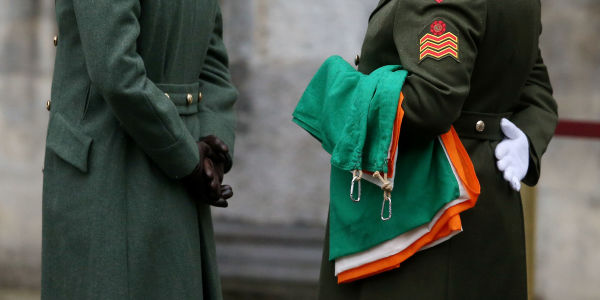Three leading figures from the 1916 Easter Rising were never awarded with a military medal for their role in the rebellion, newly declassified files reveal.
The household names – Countess Markievicz, Cathal Brugha and Sean Russell – are among just a handful known to have fought in the insurrection but who were never officially decorated for their service.
The omission has been disclosed with the opening up for the first time of previously classified documents on those issued with the “1916 Medal”.
The Department of Defence confirmed the three were not honoured despite having “verifiable, historically proven service during Easter Week 1916.”
“No claim has ever been received by the Department in these cases and no medal was issued,” a spokesman said.
The newly released files have also revealed more rebels took part in the tumultuous rebellion against British rule than was previously stated.
Last year, it was reported the “definitive figure” was 2,558.
But military chiefs have confirmed that number is now believed to be closer to 2,600 – made up of 2,594 recognised veterans who were awarded the “1916 medal” and the small number of people who never applied for it.
The files, which include details of nearly 34,600 military medals issued during the Rising and the War of Independence, are housed in a new Military Archives building in Rathmines, Dublin.
One of the Government’s seven flagship projects to mark the centenary of the rising, the archives are sited in Cathal Brugha Barracks, named in honour of one of those never awarded a medal.
Brugha was second in command of the rebels stationed at the South Dublin Union garrison – where St James’ Hospital stands today – under Eamonn Ceannt.
Reportedly the only person outside of the Rising leaders who had a copy of the insurrection plans, he went on to become a TD and defence minister but was later killed during civil-war fighting on O’Connell Street.
The iconic Countess Markievicz was second in command to Michael Mallin at St Stephen’s Green during the Rising.
Immortalised in a poem by WB Yeats, she was the first woman elected to the House of Commons.
Sean Russell, a controversial figure, was a known veteran of the 1916 Rising who went on to become chief of staff of the IRA.
He died on board a German U-boat in 1944.
Officially opening the new Military Archives, President Michael D Higgins said the files shed light on all those who participated in the struggle for independence, not just the well-known names.
“On a more personal note, may I say how meaningful the release of the pension files has been to me and our family, through the information they convey about the experience of my father, my paternal uncles, my mother and my father’s sisters, all of whom were active in the War of Independence,” he said.
Also going on display for the first time is the Brother Allen Archival Collection.
The trove includes more than 10,000 pieces, including an original copy of the Proclamation and Rising leader Patrick Pearse’s last letter to his mother before his execution.
